Are you looking for the best Vehicle Communication Interface (VCI) for flashing Daimler ECUs using DTS Monaco, especially for DoIP modules? The C6 VCI is highly recommended due to its compatibility and support for the latest communication protocols, according to DTS-MONACO.EDU.VN. This interface streamlines car coding and diagnostic processes, and by leveraging the right tools, you can unlock advanced functionalities and enhance your automotive repair capabilities with services such as ECU programming, diagnostics, and car coding, utilizing diagnostic tools.
Contents
- 1. What is a VCI and Why Is It Important for Flashing Daimler ECUs?
- 2. What is DTS Monaco and Why Is It Used for Daimler Vehicles?
- 3. What is DoIP and Why Is It Important?
- 4. Why is the C6 VCI Recommended for Flashing Daimler ECUs with DTS Monaco, Especially DoIP Modules?
- 5. What are the Key Features to Look for in a VCI for DTS Monaco and DoIP?
- 6. What are the Alternatives to the C6 VCI?
- 7. How to Set Up the C6 VCI with DTS Monaco
- 8. Step-by-Step Guide: Adding SMR-d and Configuring DTS Monaco for OEM Benz C6 DoIP VCI
- 8.1 Adding DTS Monaco SMR-d
- 8.2 Creating a New Project
- 8.3 Final Steps
- 9. Common Issues and Troubleshooting Tips
- 10. Best Practices for Flashing Daimler ECUs with DTS Monaco
- 11. What are the Benefits of Using DTS-MONACO.EDU.VN Resources?
- 12. How Can DTS-MONACO.EDU.VN Help You with Your Car Coding Needs in the USA?
- 13. What Future Trends Should Technicians Be Aware Of?
- 14. What are the Available Training Courses at DTS-MONACO.EDU.VN?
- 15. What is the Cost of the C6 VCI and DTS Monaco Software?
- 16. How to Ensure the Security of Your Diagnostic Operations?
- 17. Where Can You Find Reliable Technical Support for DTS Monaco and the C6 VCI?
- 18. What are the Ethical Considerations When Flashing or Reprogramming ECUs?
- 19. How DoIP is Revolutionizing ECU Flashing in Daimler Vehicles?
- 20. Why Choose DTS-MONACO.EDU.VN for Your Diagnostic Training Needs?
- FAQ: Vehicle Communication Interfaces (VCIs) and DTS Monaco
- Q1: What is the primary function of a Vehicle Communication Interface (VCI) in automotive diagnostics?
- Q2: Why is the C6 VCI highly recommended for flashing Daimler ECUs with DTS Monaco?
- Q3: What is DoIP, and why is it important for modern vehicle diagnostics?
- Q4: Can older VCIs like MB Star C4/C5 be used for newer Daimler vehicles with DoIP?
- Q5: What are some key features to look for in a VCI for DTS Monaco and DoIP?
- Q6: What are the potential risks of using an incompatible VCI for ECU flashing?
- Q7: How can DTS-MONACO.EDU.VN assist with learning DTS Monaco and car coding?
- Q8: What security measures should be taken during diagnostic operations to protect vehicle systems?
- Q9: What ethical considerations should be kept in mind when flashing or reprogramming ECUs?
- Q10: What future trends in automotive technology should technicians be aware of?
1. What is a VCI and Why Is It Important for Flashing Daimler ECUs?
A Vehicle Communication Interface (VCI) acts as a bridge between your diagnostic software (like DTS Monaco) and the vehicle’s electronic control units (ECUs). This interface allows you to communicate with the ECUs to read data, perform diagnostics, and, importantly, flash or reprogram them. Flashing involves overwriting the existing software on an ECU with a new version, which can be necessary for various reasons, including:
- Software Updates: Addressing bugs or performance issues in the ECU’s existing software.
- ECU Repair: Correcting corrupted software that may be causing malfunctions.
- Performance Tuning: Optimizing the ECU’s parameters for better performance or fuel efficiency.
- Feature Retrofitting: Enabling new features or functionalities that were not originally present in the vehicle.
For Daimler vehicles, especially those using the Diagnostics over Internet Protocol (DoIP), a robust and compatible VCI is critical for successful flashing. A poor VCI choice can lead to data corruption, incomplete flashing, or even damage to the ECU.
2. What is DTS Monaco and Why Is It Used for Daimler Vehicles?
DTS Monaco is a powerful, official diagnostic and engineering software used extensively for Daimler (Mercedes-Benz and Smart) vehicles. It allows technicians and engineers to perform a wide range of functions, including:
- Advanced Diagnostics: Reading and clearing diagnostic trouble codes (DTCs), performing component testing, and analyzing live data streams.
- ECU Flashing/Programming: Updating or reprogramming ECU software.
- Variant Coding: Customizing vehicle settings and features by modifying ECU parameters.
- ECU Development: Testing and validating new ECU software during the development process.
DTS Monaco is favored for its comprehensive capabilities, direct access to ECU functions, and its ability to handle complex coding and programming tasks. However, to fully utilize DTS Monaco, you need a compatible VCI that can reliably communicate with the vehicle’s ECUs.
3. What is DoIP and Why Is It Important?
DoIP (Diagnostics over Internet Protocol) is a modern communication protocol used in newer Daimler vehicles for diagnostics and ECU flashing. It offers several advantages over older protocols like CAN (Controller Area Network), including:
- Higher Bandwidth: DoIP allows for faster data transfer rates, which is essential for flashing large ECU software files.
- Improved Security: DoIP incorporates security measures to prevent unauthorized access to the vehicle’s ECUs.
- Standardized Protocol: DoIP is based on standard internet protocols, making it easier to integrate with existing diagnostic systems.
As Daimler moves towards more advanced vehicle architectures, DoIP is becoming increasingly prevalent. Therefore, if you work on newer Mercedes-Benz or Smart vehicles, having a VCI that supports DoIP is crucial.
4. Why is the C6 VCI Recommended for Flashing Daimler ECUs with DTS Monaco, Especially DoIP Modules?
The C6 VCI, often referred to as the MB Star C6, is widely recommended for flashing Daimler ECUs with DTS Monaco, particularly for DoIP modules, due to its specific advantages:
- Full DoIP Support: The C6 VCI is designed to fully support the DoIP protocol, ensuring reliable and fast communication with newer Daimler vehicles.
- Compatibility with DTS Monaco: It’s specifically engineered to work seamlessly with DTS Monaco software, providing access to all diagnostic and programming functions.
- OEM-Level Functionality: The C6 VCI offers OEM-level diagnostic and programming capabilities, allowing you to perform the same tasks as authorized Mercedes-Benz dealerships.
- Stable Connection: It provides a stable and reliable connection, which is crucial during the flashing process to prevent interruptions that could damage the ECU.
- Future-Proof: As Daimler continues to adopt DoIP and other advanced communication protocols, the C6 VCI will remain a compatible and valuable tool.
For technicians and workshops specializing in Mercedes-Benz and Smart vehicles, the C6 VCI is a worthwhile investment that enhances their diagnostic and programming capabilities.
5. What are the Key Features to Look for in a VCI for DTS Monaco and DoIP?
When selecting a VCI for use with DTS Monaco and DoIP, consider these key features:
| Feature | Description | Why It’s Important |
|---|---|---|
| DoIP Support | Ensures compatibility with newer Daimler vehicles that use DoIP for diagnostics and flashing. | Essential for working on the latest Mercedes-Benz and Smart models. |
| DTS Monaco Compatibility | Designed to work seamlessly with DTS Monaco software, providing access to all diagnostic and programming functions. | Maximizes the capabilities of DTS Monaco and ensures reliable communication with ECUs. |
| Stable Connection | Offers a robust and uninterrupted connection during flashing and diagnostic procedures. | Prevents data corruption or ECU damage caused by connection drops. |
| Fast Data Transfer | Supports high-speed data transfer rates, which are crucial for flashing large ECU software files. | Reduces flashing time and improves overall efficiency. |
| Security Features | Incorporates security measures to prevent unauthorized access to the vehicle’s ECUs. | Protects the vehicle’s systems from malicious attacks and ensures data integrity. |
| Regular Updates | Receives regular software and firmware updates to maintain compatibility with new vehicle models and software versions. | Ensures that the VCI remains up-to-date and capable of handling the latest diagnostic and programming tasks. |
| User-Friendly Interface | Easy to set up and use, with clear instructions and intuitive software. | Reduces the learning curve and minimizes the risk of errors. |
| Reliable Hardware | Built with high-quality components to withstand the demands of automotive repair environments. | Ensures long-term durability and reliability. |
6. What are the Alternatives to the C6 VCI?
While the C6 VCI is a popular choice, there are alternative VCIs that can be used for flashing Daimler ECUs with DTS Monaco, though they may have limitations in terms of DoIP support or overall compatibility:
- MB Star C4/C5: These are older generation VCIs that support CAN communication but may have limited or no DoIP support. They can be used for older Mercedes-Benz vehicles but are not recommended for newer models.
- VXDIAG VCX DoIP: This is a multi-brand VCI that supports DoIP and is compatible with DTS Monaco. It’s a more versatile option but may not offer the same level of OEM-specific functionality as the C6 VCI.
- Openport 2.0: While primarily used for tuning and reprogramming Subaru and Mitsubishi vehicles, the Openport 2.0 can also be used with DTS Monaco for some Daimler vehicles. However, DoIP support is limited, and it requires advanced technical knowledge to configure.
When choosing an alternative VCI, carefully consider its compatibility with DTS Monaco, its level of DoIP support, and its overall reliability.
7. How to Set Up the C6 VCI with DTS Monaco
Setting up the C6 VCI with DTS Monaco involves a few key steps:
- Install the VCI Drivers: Install the drivers provided with the C6 VCI on your computer.
- Connect the VCI: Connect the C6 VCI to your computer via USB or Wi-Fi and to the vehicle’s OBD-II port.
- Configure DTS Monaco: In DTS Monaco, select the C6 VCI as the communication interface.
- Test the Connection: Verify that DTS Monaco can successfully communicate with the vehicle’s ECUs.
Detailed instructions on setting up the C6 VCI with DTS Monaco can be found in the VCI’s user manual and on online forums.
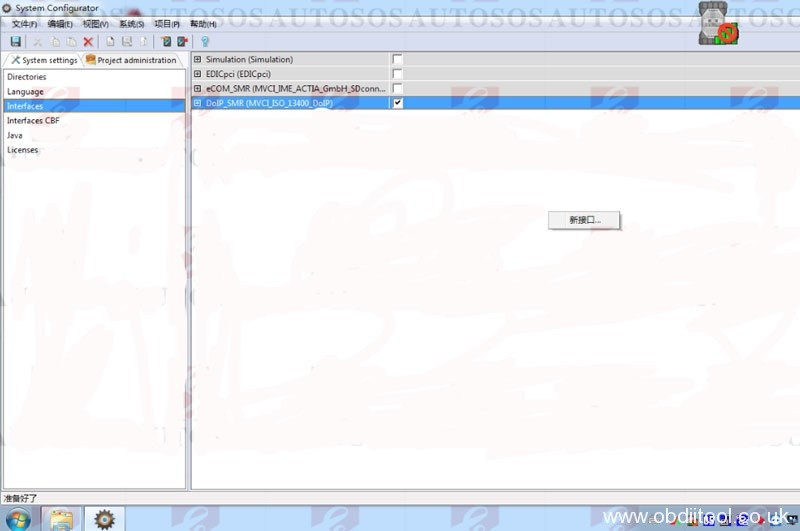 Adding SMR-d to Benz C6 DoIP VCI DTS-Monaco
Adding SMR-d to Benz C6 DoIP VCI DTS-Monaco
8. Step-by-Step Guide: Adding SMR-d and Configuring DTS Monaco for OEM Benz C6 DoIP VCI
This guide provides a detailed walkthrough on adding SMR-d files and configuring your DTS Monaco software for use with an OEM Benz C6 DoIP VCI. Please ensure you have the necessary software HDD and keygen before proceeding.
8.1 Adding DTS Monaco SMR-d
-
Open DTS System Configurator: Locate and open the “DTS System Configurator” on your desktop.
-
Select Interfaces: In the configurator, find and select the “Interfaces” option.
-
Create New Interface: Right-click within the Interfaces section and choose to open a new interface.
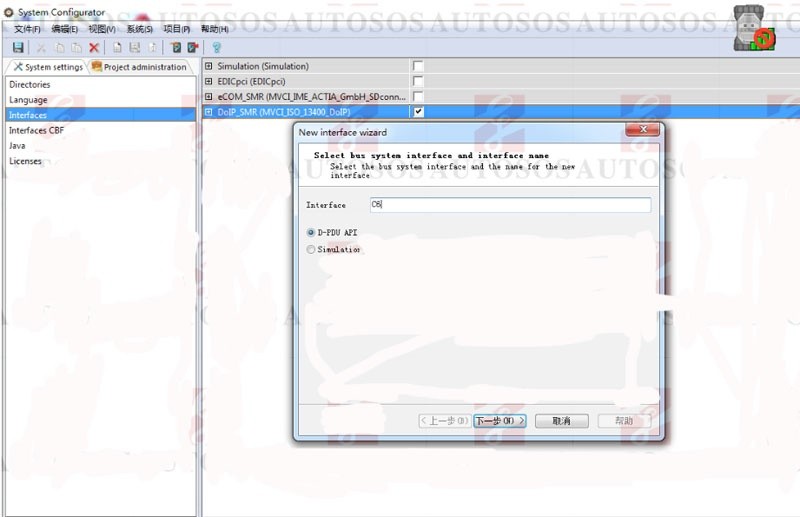 Manually enter Interface C6
Manually enter Interface C6 -
Enter Interface Name: Manually type “C6” as the interface name and click “Next”.
-
Configure Benz C6 VCI: Configure the Benz C6 VCI settings as follows:
- D-PDU API:
Bosch_D-PDU_APO_Bosch_MTS6532 - Module:
MODULE_TYPE-ID_MTS6532 - Cable:
OBD_STICABLE_ONLY
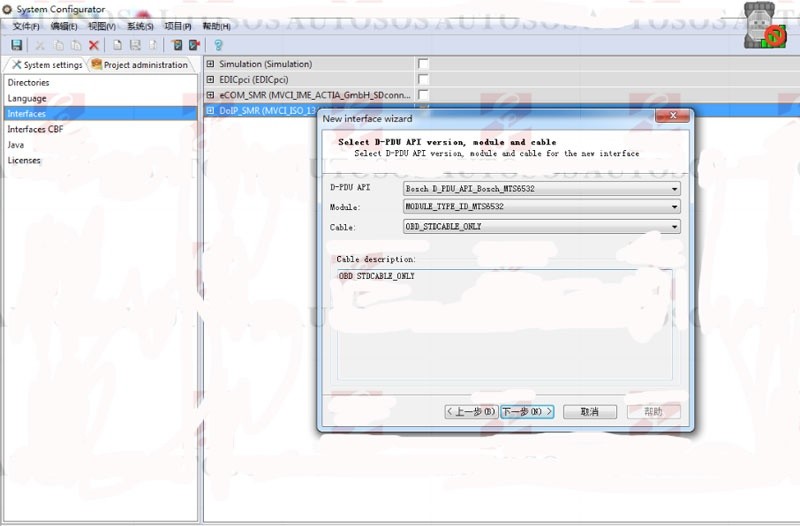 Configure Benz C6 VCI as picture below D-PDU API: Bosch_D-PDU_APO_Bosch_MTS6532 Module: MODULE_TYPE-ID_MTS6532 Cable:OBD_STICABLE_ONLY
Configure Benz C6 VCI as picture below D-PDU API: Bosch_D-PDU_APO_Bosch_MTS6532 Module: MODULE_TYPE-ID_MTS6532 Cable:OBD_STICABLE_ONLY - D-PDU API:
-
Select CAN I Interface Link: Choose the “CAN I” interface link option.
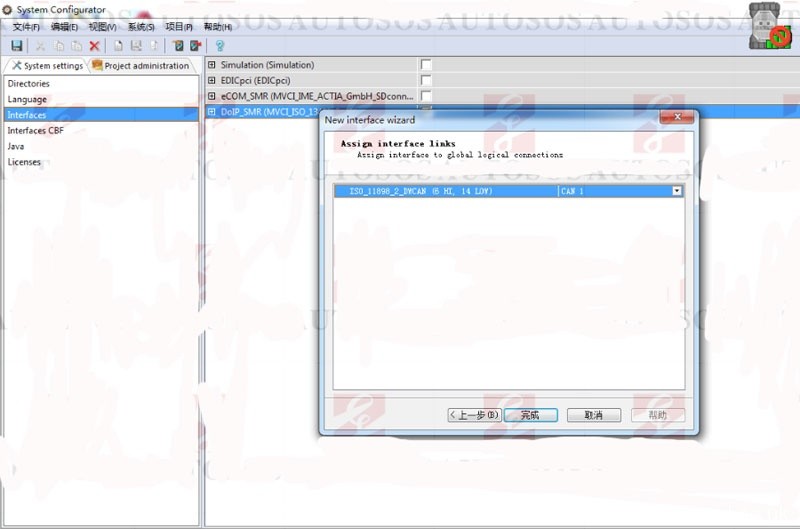 Select CAN I interface link
Select CAN I interface link -
Enable Benz C6 DoIP: Enable the Benz C6 DoIP settings.
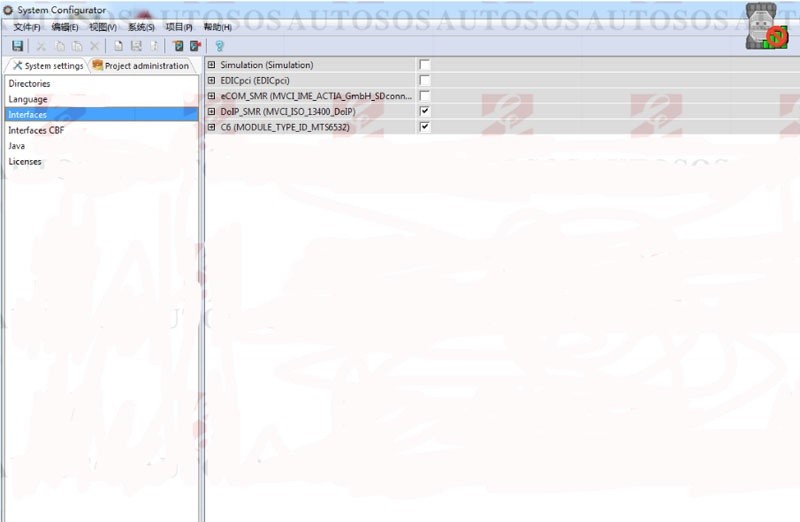 Enable Benz C6 DoIP as picture below
Enable Benz C6 DoIP as picture below -
Choose eCOM CBF (DCDIPartP): Select “eCOM CBF (DCDIPartP)” as the communication protocol.
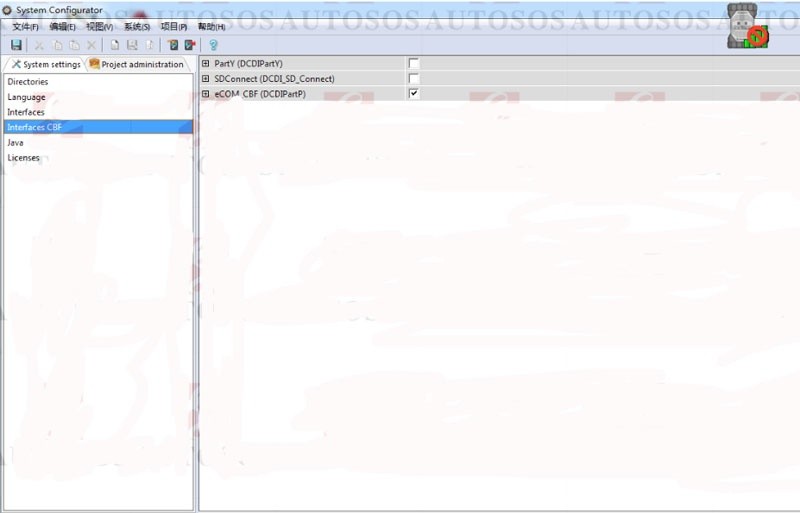 Choose eCOM CBF (DCDIPartP)
Choose eCOM CBF (DCDIPartP)
8.2 Creating a New Project
-
Select Project Administrator: Open the DTS Monaco software and select “Project administrator”.
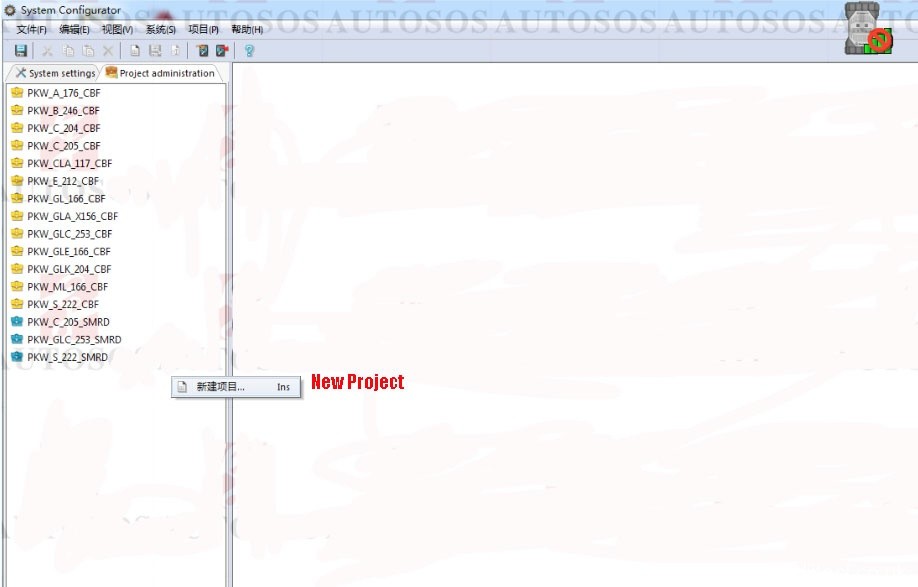 Select Project administrator, create new project
Select Project administrator, create new project -
Create New Project: Create a new project within the Project administrator.
-
Select Modular Optimized Database: Choose the option to select a “modular optimized database (*.SMR-*)”.
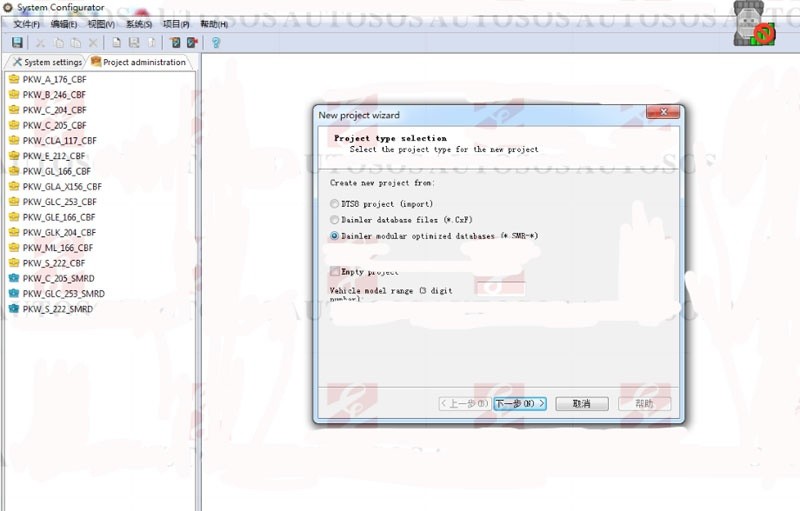 Select modular optimized database (*.SMR-*)
Select modular optimized database (*.SMR-*) -
Add CGW_204.smr-d: Add the
CGW_204.smr-dfile to your project. Add CGW_204.smr-d
Add CGW_204.smr-d -
Verify Project: Ensure that the project is correctly named
CGW_204.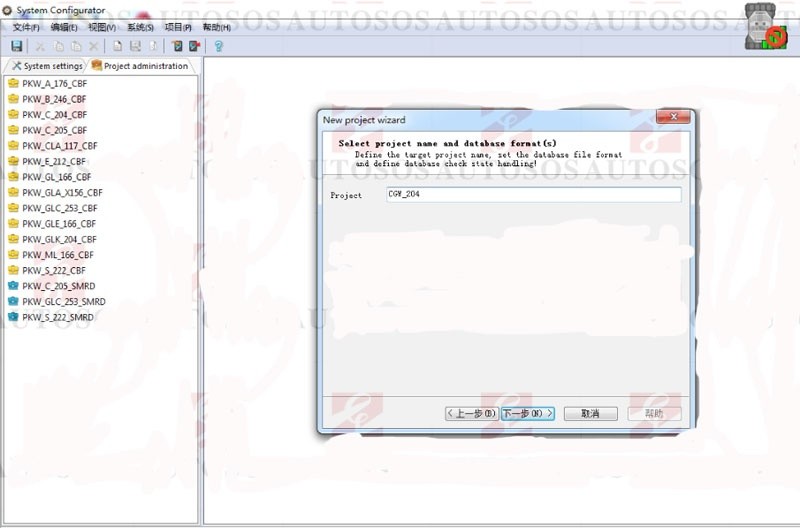 Project: CGW_204
Project: CGW_204 -
Confirm Success: Verify that the
CGW_204.smr-dfile has been successfully added to the project.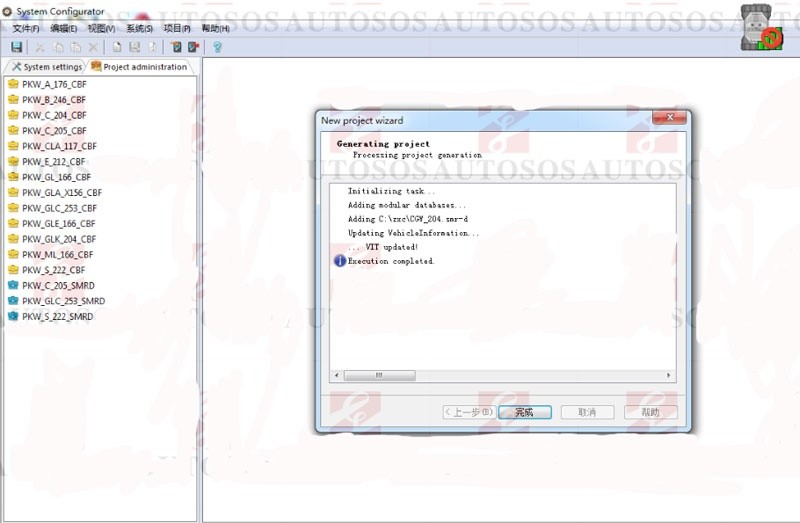 Add CGW_204.smr-d success
Add CGW_204.smr-d success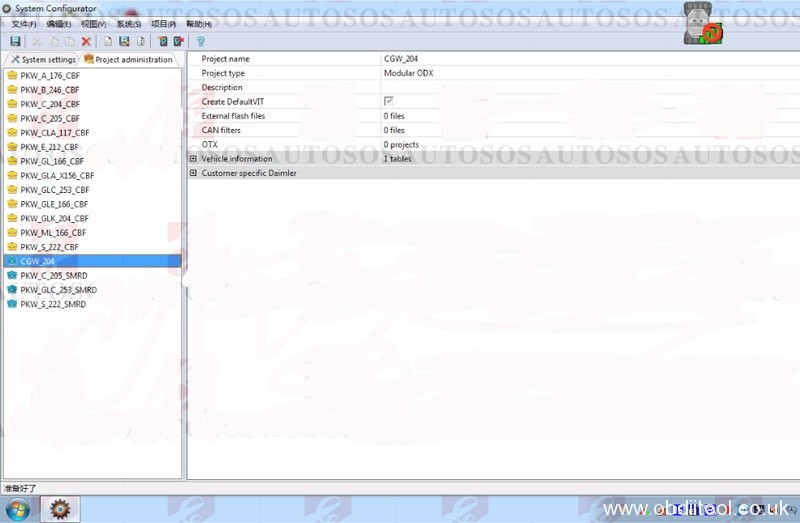 Add CGW_204.smr-d success
Add CGW_204.smr-d success
8.3 Final Steps
-
Enter DTS Monaco Software: Open the DTS Monaco software.
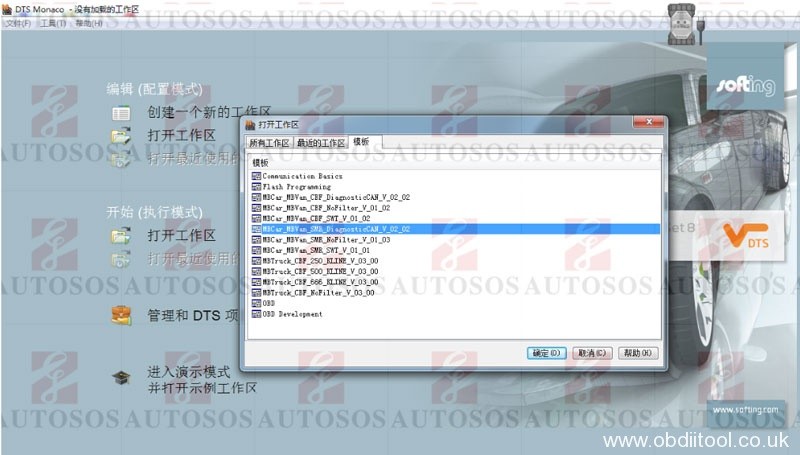 Enter DTS Monaco software
Enter DTS Monaco software -
Select CGW_204 Project: Choose the
CGW_204project from the available options.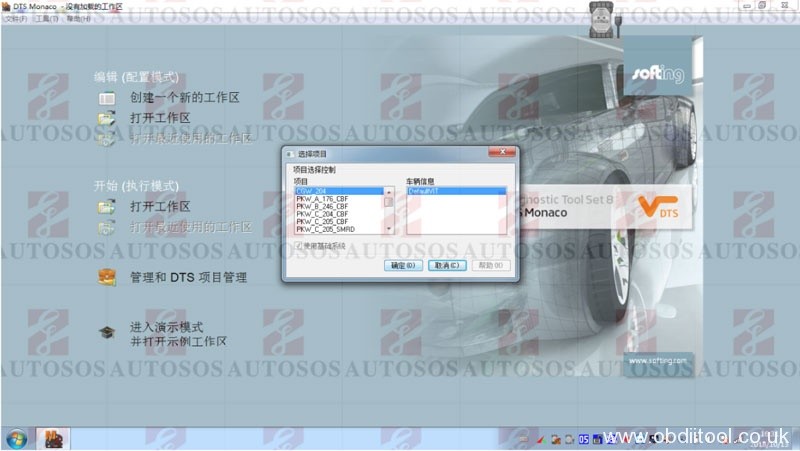 Select CGW_204 project
Select CGW_204 project -
Login Project: Log in to the selected project.
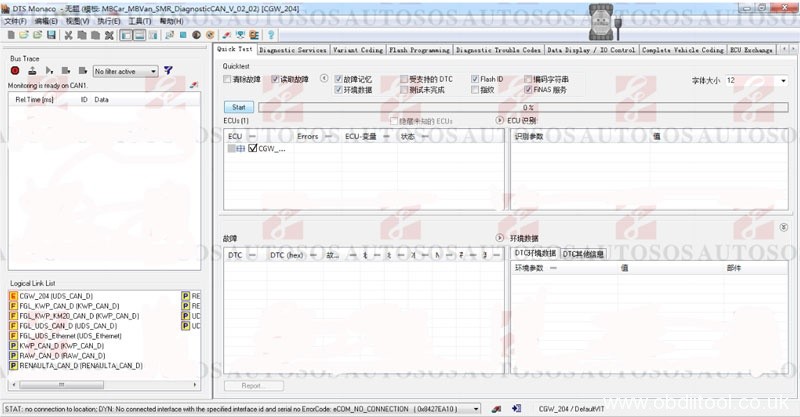 Login project
Login project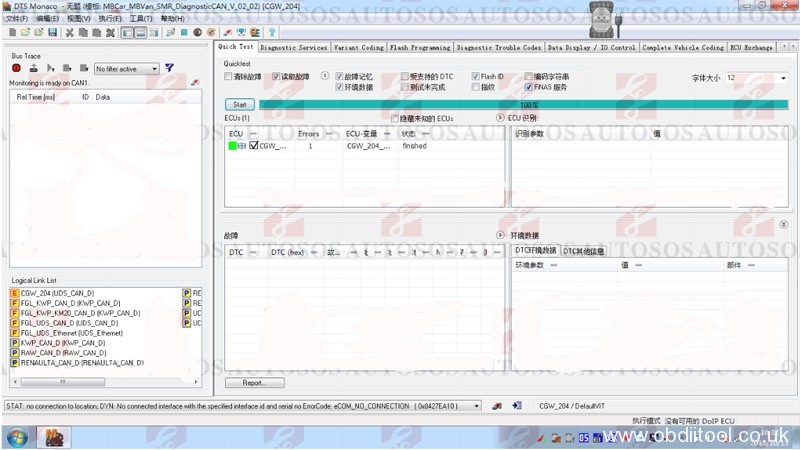 Login project
Login project -
Flash Modules: You can now proceed to flash modules using the DTS Monaco software.
By following these steps, you should be able to successfully configure your DTS Monaco software for use with the OEM Benz C6 DoIP VCI and flash modules efficiently.
9. Common Issues and Troubleshooting Tips
Even with the right VCI, you may encounter issues during the flashing process. Here are some common problems and troubleshooting tips:
| Issue | Possible Cause(s) | Troubleshooting Tip(s) |
|---|---|---|
| Communication Errors | Incorrect VCI configuration, faulty cable | Double-check VCI settings in DTS Monaco, try a different USB cable, ensure the VCI is properly connected to the vehicle. |
| Flashing Process Interrupted | Unstable connection, low battery voltage | Ensure a stable connection between the VCI and the vehicle, use a battery maintainer to keep the vehicle’s voltage stable during flashing. |
| ECU Not Responding | Incorrect ECU selection, incompatible software | Verify that you have selected the correct ECU in DTS Monaco, ensure that the software you are using is compatible with the ECU’s hardware and software version. |
| Software Errors | Corrupted DTS Monaco installation, driver issues | Reinstall DTS Monaco, update VCI drivers, check for conflicts with other software. |
| DoIP Connection Problems | Incorrect DoIP settings, network issues | Verify that DoIP is enabled in DTS Monaco and the VCI configuration, check your network settings, ensure that the vehicle is properly configured for DoIP communication. |
| VCI Not Recognized by Computer | Driver issues, faulty USB port | Reinstall VCI drivers, try a different USB port, test the VCI on another computer. |
| DTS Monaco Freezes or Crashes | Insufficient system resources, software bugs | Close unnecessary applications, increase the amount of RAM allocated to DTS Monaco, update DTS Monaco to the latest version, check for known bugs or compatibility issues with your operating system. |
10. Best Practices for Flashing Daimler ECUs with DTS Monaco
To ensure a successful and safe flashing process, follow these best practices:
- Use a High-Quality VCI: Invest in a reputable VCI like the C6 to ensure reliable communication and DoIP support.
- Maintain a Stable Power Supply: Use a battery maintainer to keep the vehicle’s voltage stable during flashing.
- Ensure a Stable Connection: Use a wired connection (USB) whenever possible to minimize the risk of connection drops.
- Use the Correct Software: Ensure that you are using the correct version of DTS Monaco and the appropriate software files for the ECU you are flashing.
- Follow Instructions Carefully: Read and follow the flashing instructions provided by Daimler or the ECU manufacturer.
- Back Up Data: Before flashing, back up any important data from the ECU in case something goes wrong.
- Be Patient: Flashing can take time, so be patient and avoid interrupting the process.
- Verify Success: After flashing, verify that the ECU is functioning correctly and that there are no new diagnostic trouble codes (DTCs).
By following these best practices, you can minimize the risk of errors and ensure a successful outcome.
11. What are the Benefits of Using DTS-MONACO.EDU.VN Resources?
DTS-MONACO.EDU.VN offers a range of resources to help you master DTS Monaco and car coding for Daimler vehicles:
- Detailed Guides: Step-by-step tutorials and guides on using DTS Monaco for various tasks, including ECU flashing, variant coding, and diagnostics.
- Training Courses: Comprehensive training courses that cover the fundamentals of DTS Monaco, advanced coding techniques, and troubleshooting tips.
- Software Downloads: Access to the latest versions of DTS Monaco software, ECU data files, and other essential resources.
- Technical Support: Expert technical support to help you resolve any issues you may encounter while using DTS Monaco.
- Community Forum: A community forum where you can connect with other DTS Monaco users, share knowledge, and ask questions.
By leveraging these resources, you can gain the knowledge and skills you need to confidently and effectively work on Daimler vehicles with DTS Monaco.
12. How Can DTS-MONACO.EDU.VN Help You with Your Car Coding Needs in the USA?
DTS-MONACO.EDU.VN is dedicated to providing top-notch training and resources for automotive professionals in the USA looking to enhance their skills in car coding and diagnostics. Here’s how we can help:
- Comprehensive Training Programs: We offer detailed training programs designed to equip you with the knowledge and expertise needed to excel in car coding using DTS Monaco. Our courses cover everything from basic concepts to advanced techniques, ensuring you’re ready to tackle any coding challenge.
- Expert Instructors: Learn from industry-leading experts with years of experience in automotive diagnostics and car coding. Our instructors provide hands-on training and personalized guidance to help you master DTS Monaco and other essential tools.
- Up-to-Date Resources and Software: Gain access to the latest software versions, ECU data files, and comprehensive guides. We ensure you have the most current resources at your fingertips, keeping you ahead in the rapidly evolving field of automotive technology.
- Customized Support: We understand that every technician has unique needs. That’s why we offer customized support to address your specific challenges and goals. Whether you’re troubleshooting a complex coding issue or seeking advice on the best tools for a particular job, our team is here to help.
- Networking Opportunities: Connect with a community of like-minded professionals through our forums and training sessions. Share insights, ask questions, and collaborate on projects to expand your network and grow your expertise.
With DTS-MONACO.EDU.VN, you’re not just getting a service; you’re joining a community dedicated to excellence in automotive technology.
13. What Future Trends Should Technicians Be Aware Of?
The automotive industry is constantly evolving, and technicians need to stay up-to-date with the latest trends to remain competitive:
- Increased Use of DoIP: As more and more vehicles adopt DoIP, technicians will need VCIs and diagnostic tools that fully support this protocol.
- Cybersecurity: With the increasing connectivity of vehicles, cybersecurity is becoming a major concern. Technicians need to be aware of security vulnerabilities and how to protect vehicle systems from attacks.
- Over-the-Air (OTA) Updates: OTA updates are becoming more common, allowing manufacturers to update vehicle software remotely. Technicians need to understand how OTA updates work and how to handle any issues that may arise.
- Electric Vehicles (EVs): The growing popularity of EVs is creating new challenges and opportunities for technicians. They need to be trained on how to diagnose and repair EV systems, including batteries, electric motors, and charging systems.
- Advanced Driver-Assistance Systems (ADAS): ADAS features like adaptive cruise control, lane departure warning, and automatic emergency braking are becoming increasingly common. Technicians need to be able to calibrate and repair these systems accurately.
By staying informed about these trends and investing in the necessary training and equipment, technicians can ensure that they are well-prepared for the future of automotive repair.
14. What are the Available Training Courses at DTS-MONACO.EDU.VN?
DTS-MONACO.EDU.VN offers a variety of training courses designed to meet the needs of technicians of all skill levels. These courses include:
- DTS Monaco Fundamentals: This introductory course covers the basics of DTS Monaco, including installation, configuration, and basic diagnostic functions.
- Advanced Coding Techniques: This course delves into advanced coding techniques, such as variant coding, SCN coding, and flashing.
- DoIP Diagnostics and Programming: This course focuses on diagnosing and programming vehicles that use the DoIP protocol.
- ECU Repair and Reprogramming: This course covers the techniques and tools needed to repair and reprogram ECUs.
- Customized Training: DTS-MONACO.EDU.VN also offers customized training courses tailored to the specific needs of your shop or organization.
For detailed information about course schedules, pricing, and registration, please visit DTS-MONACO.EDU.VN.
15. What is the Cost of the C6 VCI and DTS Monaco Software?
The cost of the C6 VCI and DTS Monaco software can vary depending on the supplier and the specific package you choose. Generally, you can expect to pay:
- C6 VCI: $800 to $1500
- DTS Monaco Software: $500 to $2000 (depending on the license and features included)
It’s important to purchase the C6 VCI and DTS Monaco software from a reputable supplier to ensure that you are getting genuine products and reliable support. Be wary of extremely low prices, as these may indicate counterfeit or pirated software.
16. How to Ensure the Security of Your Diagnostic Operations?
In today’s connected world, ensuring the security of your diagnostic operations is more critical than ever. Here are some steps you can take to protect your systems and data:
- Use Strong Passwords: Use strong, unique passwords for all of your diagnostic accounts and devices.
- Keep Software Updated: Regularly update your diagnostic software and VCI firmware to patch any security vulnerabilities.
- Install Antivirus Software: Install and maintain antivirus software on your diagnostic computers to protect against malware.
- Use a Firewall: Use a firewall to block unauthorized access to your diagnostic network.
- Secure Your Wi-Fi Network: If you use Wi-Fi for diagnostics, make sure your network is secured with a strong password and encryption.
- Be Careful of Phishing Scams: Be wary of phishing emails or websites that may try to steal your login credentials or other sensitive information.
- Train Your Staff: Train your staff on security best practices to help them avoid common mistakes that could compromise your systems.
By following these security measures, you can minimize the risk of cyberattacks and protect your diagnostic operations.
17. Where Can You Find Reliable Technical Support for DTS Monaco and the C6 VCI?
Finding reliable technical support is crucial when working with complex diagnostic tools like DTS Monaco and the C6 VCI. Here are some resources you can turn to:
- DTS-MONACO.EDU.VN: Offers expert technical support for DTS Monaco and car coding.
- VCI Supplier: Contact the supplier from whom you purchased the C6 VCI for hardware-related issues.
- Online Forums: Participate in online forums and communities dedicated to DTS Monaco and automotive diagnostics. These forums can be a valuable source of information and troubleshooting tips.
- Professional Training Courses: Enroll in professional training courses that offer technical support as part of the package.
18. What are the Ethical Considerations When Flashing or Reprogramming ECUs?
Flashing or reprogramming ECUs can have significant implications for vehicle performance, safety, and emissions. It’s important to be aware of the ethical considerations involved:
- Legality: Ensure that any modifications you make to the ECU are legal and comply with all applicable regulations.
- Safety: Avoid making changes that could compromise the safety of the vehicle or its occupants.
- Emissions: Do not make changes that could increase the vehicle’s emissions or violate emissions standards.
- Transparency: Be transparent with your customers about any modifications you make to their vehicles and the potential consequences.
- Liability: Understand your liability in case something goes wrong as a result of your modifications.
By considering these ethical factors, you can ensure that you are using your skills responsibly and protecting the interests of your customers and the environment.
19. How DoIP is Revolutionizing ECU Flashing in Daimler Vehicles?
DoIP (Diagnostics over Internet Protocol) represents a significant leap forward in ECU flashing technology for Daimler vehicles. Its high-speed data transfer capabilities drastically reduce the time required for flashing, enabling quicker turnaround times in service bays. This efficiency is crucial for modern automotive repair shops aiming to maximize productivity. Furthermore, DoIP’s enhanced security features protect against unauthorized access, ensuring the integrity of ECU software during updates. With the increasing complexity of automotive systems, DoIP provides a robust and reliable communication protocol that supports the advanced diagnostics and programming needs of today’s vehicles.
20. Why Choose DTS-MONACO.EDU.VN for Your Diagnostic Training Needs?
When it comes to mastering DTS Monaco and advanced car coding techniques, DTS-MONACO.EDU.VN stands out as the premier choice for automotive professionals. Our comprehensive training programs are designed to equip you with the skills and knowledge needed to excel in this rapidly evolving field. Here’s why you should choose us:
- Expert Instructors: Learn from industry-leading experts with years of hands-on experience.
- Cutting-Edge Curriculum: Stay ahead of the curve with our up-to-date curriculum that covers the latest technologies and techniques.
- Hands-On Training: Gain practical experience through hands-on training exercises using real-world scenarios.
- Customized Support: Receive personalized support and guidance tailored to your specific needs and goals.
- Community Access: Connect with a community of like-minded professionals to share knowledge and collaborate on projects.
Don’t settle for second-best. Invest in your future with DTS-MONACO.EDU.VN and unlock your full potential in the world of automotive diagnostics and car coding.
Ready to take your skills to the next level? Visit DTS-MONACO.EDU.VN today to explore our training programs and discover how we can help you achieve your professional goals. Contact us at Whatsapp: +1 (641) 206-8880 or visit our location at 275 N Harrison St, Chandler, AZ 85225, United States.
FAQ: Vehicle Communication Interfaces (VCIs) and DTS Monaco
Q1: What is the primary function of a Vehicle Communication Interface (VCI) in automotive diagnostics?
A VCI connects diagnostic software like DTS Monaco to a vehicle’s ECUs, enabling communication for data reading, diagnostics, and ECU flashing.
Q2: Why is the C6 VCI highly recommended for flashing Daimler ECUs with DTS Monaco?
The C6 VCI offers full DoIP support, seamless compatibility with DTS Monaco, OEM-level functionality, and a stable connection, making it ideal for flashing Daimler ECUs.
Q3: What is DoIP, and why is it important for modern vehicle diagnostics?
DoIP (Diagnostics over Internet Protocol) is a modern communication protocol that provides higher bandwidth, improved security, and a standardized protocol for diagnostics and ECU flashing in newer vehicles.
Q4: Can older VCIs like MB Star C4/C5 be used for newer Daimler vehicles with DoIP?
MB Star C4/C5 have limited or no DoIP support, making them unsuitable for newer Daimler vehicles that require DoIP for diagnostics and flashing.
Q5: What are some key features to look for in a VCI for DTS Monaco and DoIP?
Key features include DoIP support, DTS Monaco compatibility, a stable connection, fast data transfer, and security features.
Q6: What are the potential risks of using an incompatible VCI for ECU flashing?
Using an incompatible VCI can lead to data corruption, incomplete flashing, or damage to the ECU.
Q7: How can DTS-MONACO.EDU.VN assist with learning DTS Monaco and car coding?
DTS-MONACO.EDU.VN provides detailed guides, training courses, software downloads, technical support, and a community forum to help users master DTS Monaco and car coding.
Q8: What security measures should be taken during diagnostic operations to protect vehicle systems?
Implement strong passwords, keep software updated, use antivirus software and firewalls, secure Wi-Fi networks, and train staff on security best practices.
Q9: What ethical considerations should be kept in mind when flashing or reprogramming ECUs?
Ensure legality, prioritize safety and emissions compliance, be transparent with customers about modifications, and understand your liability.
Q10: What future trends in automotive technology should technicians be aware of?
Technicians should be aware of the increased use of DoIP, cybersecurity concerns, over-the-air (OTA) updates, electric vehicles (EVs), and advanced driver-assistance systems (ADAS).